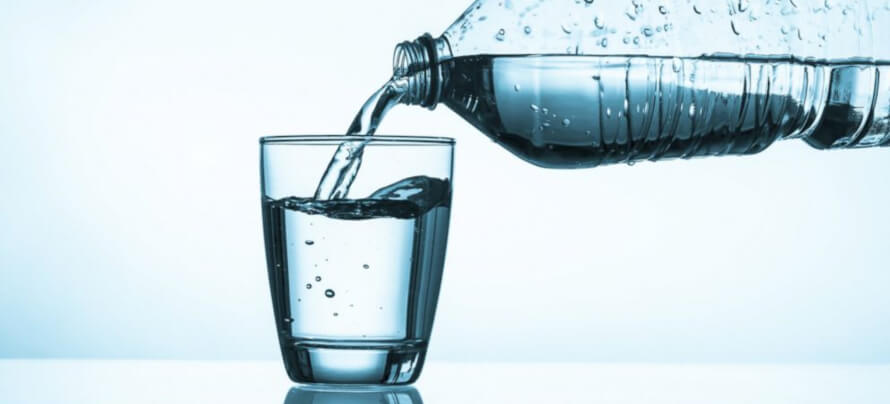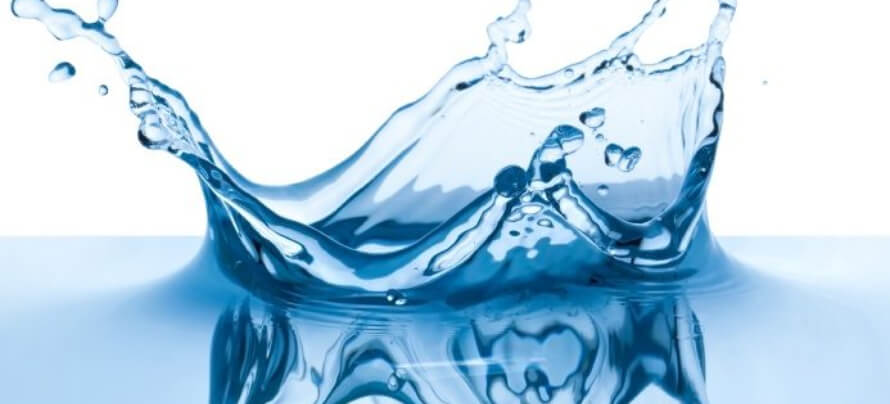Key Takeaways
- Alkaline water is water with a pH higher than seven.
- Marketers claim that alkaline water improves your health and wellbeing in myriad ways, including reducing inflammation and oxidation, improving hydration, slowing and reversing aging, and more.
- Science shows that alkaline water is not any healthier than any other type of water.
You probably know drinking water is good for you.
You probably also know dehydration is bad for you, and you’ve probably heard you should drink water frequently throughout the day and err on the side of drinking a little more than you feel necessary rather than less.
And you’re probably here because you heard that instead of drinking boring peasant water, you should avail yourself of the miraculous health benefits of alkaline water, including . . .
- Less inflammation and oxidative stress in the body
- Better hydration
- Anti-aging effects
- Weight loss
- Less joint pain and fewer headaches
- Lower risk of cancer, fatigue, leaky gut, osteoporosis, and basically every other ailment
- More energy, drive, and vitality
- And more
In fact, according to some of the self-professed H20 experts shilling alkaline water, you should never drink anything but high-pH water.
To do that, all you have to do is fork over a few grand for a contraption that uses a process called ionization (magic, basically) to transmute toxic tap water into a super-hydrating, inflammation-fighting, life-giving elixir “they” don’t want you to know about.
If you’re uncomfortable with that price tag, you’re looking at this the wrong way. Just think about how much money your pristine health is going to save you in the long run.
When your friends and family start dropping like flies due to heart disease, diabetes, cancer, and the like, you’re going to be bouncing gleefully from one day to the next, like you’ve swallowed the star from Super Mario.
So the real question is how can you not afford to buy a water sorcery machine from me for which I’ll be paid a 50% sales commission?
What’s that? You want to know if there’s any scientific evidence of these claims?
Of course there’s scientific evidence. Don’t look into it, but 97% of water scientists agree with everything I’ve just said. Now will that be cash or credit?
And this is where my comedy shtick ends and real joke begins, which is alkaline water itself. Because the short story is it’s nonsense. All of it.
Let’s find out why.
Want to listen to more stuff like this? Check out my podcast!
What Is Alkaline Water?
To answer this question, we first must understand alkaline, and to do that, we must understand pH.
In chemistry, pH is a measure of the acidity of a solution. A pH of less than seven is acidic, while a pH greater than seven is alkaline.
While many people believe that acidic substances are more likely to cause chemical changes in substances (think acid eating through metal), there are many alkaline substances, called bases, that are extremely reactive as well, such as lye.
Remember in Fight Club when Tyler Durden burned a kiss into Edward Norton’s hand? He did that with lye, which has an extremely high pH of 13 and can burn and melt organic material like your skin.
Now, pure water has a pH of exactly 7, making it neutral, and due to various impurities what you drink can give it a slightly higher or lower pH.
For example, well water can have a pH of anywhere from 6.5 (slightly acidic) to 8.5 (slightly alkaline) due to the minerals imparted from the soil. Most tap water has a pH of about 7.5 due to chemicals like chlorine, fluoride, and other substances that make the water slightly alkaline.
Alkaline water, then, is water with a pH over 7, which is going to be most water you might drink, whether from a tap, bottle, filter, or well.
What Is Ionized Water?

An ion is an atom that contains an electric charge due to a loss or gain of one or more electrons.
While the term ionized water might lead you to believe it’s special water that has been infused with electricity or cosmic rays or the spirits of sea gods or something, the truth is far less sexy.
Pure water is composed of three atoms—two hydrogen atoms and one oxygen—with a neutral charge. Thus, by definition, water molecules aren’t ions.
Water molecules are also very stable, meaning they rarely break down or change form unless acted upon by various chemicals or electricity. They do decay over time, however, and eventually break down into two ions: a positively charged hydrogen atom and negatively charged hydroxyl, which consists of one oxygen and hydrogen atom.
Under normal circumstances, these ions exist for just a fraction of a second before they’re converted back into regular water molecules. This means that at any given moment, only a few ions exist for every billion water molecules.
While there are electrical and chemical ways to increase the breakdown of water molecules into ions, they’re far outpaced by the natural process that converts them back into water, so the end result is more or less no real change.
What this means, then, is all water is “ionized” to a very slight degree, and no matter how it’s treated, including electrolysis, the concentration of ions is always vanishingly small.
There’s a much simpler—and less sexy—way to increase the ion content of water, however: add minerals to it.
For instance, minerals such as calcium phosphate, magnesium carbonate, and sodium chloride, are ions, and if you add just a few micrograms of one or more of them into a cup of water, voila, you now have slightly “ionized” water. Hell, simply adding table salt (sodium chloride, another ion) technically “ionizes” the water.
This is why some “water ionization” machines add minerals to the water, typically calcium phosphate or magnesium carbonate—to increase the ion content of the water.
The (pointless) electrical component of the process is emphasized in the marketing of these machines, however, because it sounds more scientific and effective than the inclusion of a couple cheap minerals.
And more importantly, you don’t need to buy a pricey gizmo to “ionize” your water with minerals. A bag of bulk mineral powder and your fingers will get the job done just as well.
Why Do People Drink Alkaline and Ionized Water?
The primary reason people drink alkaline water is they believe it will improve their health, usually by increasing the alkalinity of their blood. This is supposedly desirable because it’s claimed that most types of disease can only develop and flourish in an acidic environment.
When it comes to ionized water, the common reasons cited for drinking it are reducing inflammation and oxidative stress and increasing hydration, which is purported to produce weight loss, healthier skin, a decreased risk of cancer, and other rather dramatic benefits.
In other words, many people think they can reduce the risk of or even cure many of the ailments that plague our modern society by just drinking a bit of specially treated water every day.
Is Alkaline Water Better for You than Regular Water?

The basic theoretical underpinnings of how drinking alkaline water might improve your health, performance, and longevity are the same as those propping up alkaline dieting.
Like water, some foods can be slightly acidic and other foods can be slightly alkaline, and according to alkaline dieters, you should only eat alkaline foods and avoid acidic foods because . . .
- The body functions best when the pH of your blood is slightly alkaline, and when it’s acidic, the risk of disease and dysfunction go up.
- Eating too many acidic foods lowers your blood’s pH to unhealthy levels, whereas eating alkaline foods helps preserve a healthy pH level.
This model is horribly flawed, and if you want to learn why, check out this article on the alkaline diet:
Why the Alkaline Diet is Flawed and Overrated
Drinking alkaline water is supposed to have similar effects in the body as eating alkaline foods. Specifically, it’s supposed to neutralize the acidity of lower-pH foods you might eat and generally keep your blood pH in an alkaline, optimal range.
The problem with all of this is it presupposes that the foods and beverages you drink can markedly influence the pH of your blood and wreak havoc in your body.
Science disagrees.
Research shows that what you eat and drink has almost no impact on the pH of your blood or organs. And that’s good because if they did, you’d be dead instead of reading this article.
Like body temperature, blood pH is tightly regulated to remain in the range of 7.36 to 7.44—something scientists have understood since the 1930s. To move the blood pH needle, you need to go to extremes like developing diabetes, starving yourself, or overdosing on alcohol, not eating a hamburger or drinking a soda.
Logically, this makes sense.
If you passed sixth grade biology, you know that everything you eat and drink is reduced to an acidic slurry inside your stomach called chyme. Then, as chyme is emptied from the stomach into the small intestine, the body secretes a variety of alkaline chemicals to increase its pH so it can move safely through the rest of the digestive system.
In other words, the body uses a variety of methods to raise or lower the pH of the foods and liquids you eat and drink according to various stages of digestion. For instance, if water enters the stomach alkaline, it’s going to be acidic when it leaves, and then it’s going to be made alkaline again for further processing, and the same goes for the food you eat.
All of this happens long before anything enters your bloodstream, where pH is also carefully regulated by a variety of other biological mechanisms.
This is why there’s basically no research available on alkaline water: there’s no good reason to spend time or money on it. We already understand enough about how the body’s pH systems work to know that no type of water is going to significantly change blood pH and thus health or wellbeing.
That said, one of the few studies I could find that’s worth sharing was conducted by scientists at the University of Calgary.
In this review of the literature, the researchers looked for any clinical trials (as opposed to papers that simply presented unproven hypotheses) that investigated the relationship between alkaline diets or water and cancer, which is one of the hot buttons used to sell people on them.
The scientists reviewed every study they could find on the matter from the beginning of modern science to 2015, and out of 8,278 papers, they found just one that satisfied their criteria, and it found no connection between the amount of acidic or alkaline food people ate and their risk of bladder cancer. The scientists who conducted it also tested whether acidic or alkaline urine was a risk factor for cancer, and again found it wasn’t.
Thus, the University of Calgary team concluded the following:
“Despite the promotion of the alkaline diet and alkaline water by the media and salespeople, there is almost no actual research to either support or disprove these ideas.”
And let’s not forget the point I made earlier: most of the water you drink is already alkaline.
Normal drinking water, both tap and filtered, typically has a pH of around 7.5 to 8, and ironically, even if you could significantly raise the pH of the water you drink, it wouldn’t necessarily be good for you.
As you learned a moment ago, strongly alkaline substances can also be extremely toxic. A good example of this is a report written by scientists at the University of Bonn that describes the negative effects of a large quantity of lye that was accidentally dumped into the drinking water. The pH of the water increased to 12 and many people suffered skin burns as a result.
Multiple studies on rats have also shown that consuming water with a high pH causes impaired growth and damage to heart muscle cells.
You aren’t likely to suffer these effects from using an overpriced, mostly useless at-home water ionizer, of course, but it’s a good reminder that a higher pH for drinking water isn’t always better.
Now, as we’re already busy scalping, let’s meet the man who popularized alkaline dieting and drinking: Adolf Hitler.
Just kidding. That would’ve been rich though.
No, it was a shameful man named Robert Young, who was . . .
- Arrested in 1995 on two felony charges of practicing medicine without a license.
- Charged again in 2001 of practicing medicine without a license.
- Convicted in 2016 of practicing medicine without a license.
- Convicted again in 2017 of defrauding his patients, including taking $77,000 from a woman dying from cancer to inject her with baking soda, which did nothing, of course, and she died.
I don’t know about you, but I’d actually rather take dietary advice from Hitler than Young.
According to a woman who served as the Führer’s food taster, his diet “was all vegetarian, the most delicious fresh things, from asparagus to peppers and peas, served with rice and salads. It was all arranged on one plate, just as it was served to him. There was no meat and I do not remember any fish.”Sounds pretty healthy.
Oh I can see it now: My next book, The Hitler Diet: How to Eat the Reich Way. Don’t tell me that wouldn’t sell.
(Jokes aside, if you’d like specific advice about what diet to follow to reach your health and fitness goals, take the Legion Diet Quiz.)
Anyhow, the bottom line is there’s no evidence drinking alkaline water is better for your body than drinking neutral-pH or even slightly acidic water.
Is Ionized Water Better for You than Regular Water?

Quacks everywhere insist that alkaline water isn’t enough—it must be ionized as well if you want to increase the vibrational frequencies of your chakras toward the green tea infinity.
The most well-known water ionizer is the Kangen water machine, which supposedly ionizes water and raises its pH for a paltry investment of just $3,000 or more.
As I mentioned a moment ago, this machine and others like it work by adding minerals to the water and then it over a series of electrically charged metal plates. Adding minerals to the water raises its pH and ion content, and the electricity . . . well . . . it doesn’t offer any benefits but why should that get in the way of a good marketing pitch?
What does this now-ionized water do for you, you wonder?
According to liars, shills and morons, all kinds of awesome things. For starters, ionizing the water supposedly reduces the size of the water molecules, allowing them to more easily enter the body’s cells and hydrate them.
To quote one Kangen peddler on YouTube who should stop snorting so much chalk, ionized water is “more wet” than regular water. No, not wetter, you pedant. More. Wet. And when water is more wet, it also helps you beat bloating, other people claim.
The theory here is water molecules tend to bunch up into clusters, and larger ones can’t pass into your cells. By breaking the clusters up, however, your body can tap into the full power of drinking water.
There’s no evidence for any of this, of course. As far as science is concerned, water doesn’t form “clusters” of any kind regardless of how ionized, alkaline, or holy it is.
Additionally, there’s still an ongoing debate in the scientific community as to the best way to describe the structure of water. Our best guess currently is it functions as a network of molecules that are continually binding and unbinding with each other at remarkably high speeds.
Ironically, even if water molecules did form large clusters, and even if you could reduce the size of them, they’d still have to be further broken down by the body before they could enter cells.
Water enters cells through specialized channels called aquaporins, which allow one molecule of water into a cell (consisting of two hydrogen atoms and one oxygen atom) at a time. “Aqua” is latin for water, and a “porin” is a kind of protein that forms channels for stuff to pass through.
This is true of every drop of water you’ve ever consumed and will consume—it was and will be absorbed into your cells one molecule at a time. No amount of ionization or pH shenanigans are going to change this.
Another common claim made by ionization carpetbaggers is it increases the water’s antioxidant capacity, which you can confirm by examining its oxygen-reducing potential (ORP), a measurement of how much oxygen is dissolved in a solution.
ORP is generally used by biologists to determine how well a lake or other natural water source can support life at different depths.
It also sounds fancy, which is why it’s also used to convince people to buy Kangen machines. By lowering the ORP of the water you drink (the amount of oxygen dissolved in it), the pitch goes, you can reduce inflammation and oxidation in the body.
Or not because the oxygen content of drinking water doesn’t influence oxidation levels in the human body.
Like pH, the body carefully controls oxygen levels in the blood and other tissues, and there’s no evidence the amount of oxygen in the water you drink (higher or lower ORP) can influence this, inflammation, or oxidation levels whatsoever.
The bottom line is water ionizers are an out-and-out sham. There’s no way to markedly increase the ion content of water through electrical processes and there’s no reason to spend thousands of dollars to mix tiny amounts of cheap minerals into your water.
The Bottom Line on Alkaline and Ionized Water

Alkaline water is water with a higher pH higher than seven, and ionized water is just water that contains ions (which includes all water).
The pH value of the water you drink has virtually no impact on the pH of your blood or organs because . . .
- The body uses a variety of biological mechanisms to control the pH of the foods and liquids you eat, raising and lowering pH throughout the process of digestion.
- It also tightly regulates the pH of your blood and tissues, including your organs.
Thus, it’s no surprise that there’s almost no research available on alkaline water, and the little that does exist indicates it offers no health benefits whatsoever.
Water ionizer machines promise to make your water more hydrating by breaking up clusters of water molecules into smaller, more absorbable structures.
In reality, water ionizers don’t change the size of water molecules, and even if they did it wouldn’t improve cellular absorption because cells accept water one molecule at a time.
Likewise, water treated by an ionizer isn’t better for reducing inflammation or oxidation in the body, and the arguments for this boil down to pseudoscience and trickery.
At bottom, alkaline water and ionized water are manifestations of the same moral turpitude that has spawned other health and fitness scams like detox teas, lectin-free and carnivore dieting, and CBD oil.
The playbook is simple:
- Make outlandish and unproven claims that include common everyday ailments like headaches, joint pain, and fatigue.
- Use a lot of science-y buzzwords like oxidation, inflammation, oxygen-reducing potential, toxins, leaky gut, insulin, and so on, and back them up with irrelevant research and quotes from fake doctors and gurus.
- Charge extravagant amounts of money with extravagant profit margins that can fund extravagant marketing budgets and, most importantly, extravagant Tim Ferriss lifestyles.
Please don’t fall for it.
Instead of drinking overpriced woo-woo water, just drink filtered tap water frequently throughout the day (I prefer reverse osmosis machines), and err on drinking a little more than you feel you should rather than too little.
For most people, around ¾ of a gallon of water per day is perfect.
What’s your take on alkaline water? Have anything else to share? Let me know in the comments below!
Scientific References +
- Pittman, R. N. (2011). The Circulatory System and Oxygen Transport. https://www.ncbi.nlm.nih.gov/books/NBK54112/
- ME, M., KJ, S., & SM, S. (2001). Systemic and local effects of long-term exposure to alkaline drinking water in rats. International Journal of Experimental Pathology, 82(4). https://doi.org/10.1111/J.1365-2613.2001.IEP0082-0213-X
- Watanabe, T. (1997). Influence of alkaline ionized water on rat erythrocyte hexokinase activity and myocardium. Journal of Toxicological Sciences, 22(2), 141–152. https://doi.org/10.2131/jts.22.2_141
- Lendowski, L., Färber, H., Holy, A., Darius, A., Ehrich, B., Wippermann, C., Küfner, B., & Exner, M. (2015). Accidental contamination of a German town’s drinking water with sodium hydroxide. International Journal of Hygiene and Environmental Health, 218(3), 366–369. https://doi.org/10.1016/j.ijheh.2015.01.006
- Kulthanan, K., Nuchkull, P., & Varothai, S. (2013). The pH of water from various sources: an overview for recommendation for patients with atopic dermatitis. Asia Pacific Allergy, 3(3), 155. https://doi.org/10.5415/apallergy.2013.3.3.155
- Wright, M. E., Michaud, D. S., Pietinen, P., Taylor, P. R., Virtamo, J., & Albanes, D. (2005). Estimated urine pH and bladder cancer risk in a cohort of male smokers (Finland). Cancer Causes and Control, 16(9), 1117–1123. https://doi.org/10.1007/s10552-005-0348-9
- Fenton, T. R., & Huang, T. (2016). Systematic review of the association between dietary acid load, alkaline water and cancer. BMJ Open, 6(6), e010438. https://doi.org/10.1136/bmjopen-2015-010438
- Mostert, M., & Bonavia, A. (2016). Starvation ketoacidosis as a cause of unexplained metabolic acidosis in the perioperative period. American Journal of Case Reports, 17, 755–758. https://doi.org/10.12659/AJCR.900002
- Trachtenbarg, D. E. (2005). Diabetic ketoacidosis. In American Family Physician (Vol. 71, Issue 9, pp. 1705–1714). https://doi.org/10.7326/0003-4819-152-1-201001050-01001
- Fritz Bischoff, W. D. Sansum, M. Louisa Long, M. M. D. (n.d.). Effect of Acid Ash and Alkaline Ash Foodstuffs on the Acid-Base Equilibrium of Man | The Journal of Nutrition | Oxford Academic. Retrieved July 17, 2020, from https://academic.oup.com/jn/article-abstract/7/1/51/4725672?redirectedFrom=PDF
- Lee Hamm, L., Nakhoul, N., & Hering-Smith, K. S. (2015). Acid-base homeostasis. Clinical Journal of the American Society of Nephrology, 10(12), 2232–2242. https://doi.org/10.2215/CJN.07400715
- Fenton, T. R., & Lyon, A. W. (2011). Milk and acid-base balance: proposed hypothesis versus scientific evidence. Journal of the American College of Nutrition, 30(5 Suppl 1), 471S-475S. https://doi.org/10.1080/07315724.2011.10719992
- Gerry K. Schwalfenberg. (n.d.). The Alkaline Diet: Is There Evidence That an Alkaline pH Diet Benefits Health? Retrieved July 17, 2020, from https://www.ncbi.nlm.nih.gov/pmc/articles/PMC3195546/
- the berkey. (n.d.). What is the pH Level of Water? For Tap, Pure or Filtered Water. Retrieved July 17, 2020, from https://theberkey.com/blogs/water-filter/why-ph-level-in-your-water-matters
- Water Systems Council (WSC). (2007). wellcare® information on pH in Drinking Water wellcare ® information for you about pH in Drinking Water. www.wellcarehotline.orgU










